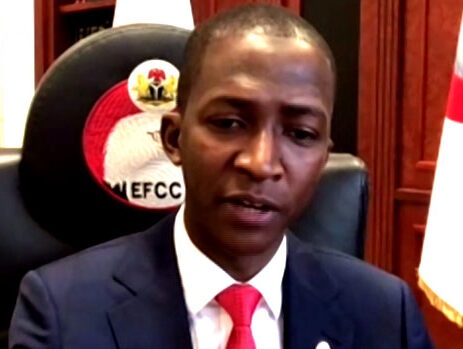Abuja court commits EFCC chairman to Kuje prison for contempt
High Court in Abuja has sent Abdulrasheed Bawa, the Chairman of the Economic and Financial Crimes Commission (EFCC) to prison for contempt of court in relation to his agency’s failure to comply with an earlier order of the court.
In a ruling on Tuesday, Justice Chizoba Oji, held that the chairman of the anti-graft agency is in contempt of the order of the court made on November 21, 2018, directing the commission to return to an applicant, his Range Rover (super charge) and the sum of N40 million.
She also ordered that Bawa should be committed to prison at Kuje Correctional Centre Abuja for his disobedience, and continued disobedience of the said order until he purges himself of the contempt.
Justice Oji further directed the Inspector General of Police, Usman Baba, to ensure that the order of this court is executed forthwith.
The judge rejected the arguments put forward by the lawyer to the EFCC, Francis Jirbo to justify his client’s action.
The ruling, which was delivered on October 28, 2022, was on a motion on notice marked: FCT/HC/M/52/2021 filed by a one-time Director of Operations at the Nigerian Air Force, Air Vice Marshal Rufus Ojuawo.
Ojuawo had filed a motion through his lawyer, R.N. Ojabo, in a suit marked: FCT/HC/CR/184/2016 that the EFCC had refused to comply with the court order directing it to release his seized property.
EFCC had arraigned Ojuawo on two counts before Justice Muawiyah Idris of the High Court of the FCT in Nyanya in 2016.
Ojuawo was accused of corruptly receiving gratification to the tune of N40 million and a Range Rover Sport (Supercharged) from one Hima Aboubakar of Societe D’Equipment Internationaux Nigeria Limited.
In a November 21, 2018 ruling, however, Justice Idris discharged and acquitted Ojuawo on the grounds that the prosecution failed to prove its case.
Idris had held that for the charge to succeed, the prosecution must prove that the defendant corruptly accepted the gift; that he accepted or obtained the gift for himself or for any other person.
He held that the burden was on the prosecution to prove all ingredients of the charge preferred against the defendant beyond reasonable doubt as required under Section 131(1) of the Evidence Act, 2011.
Follow the Neptune Prime channel on WhatsApp:
Do you have breaking news, interview request, opinion, suggestion, or want your event covered? Email us at neptuneprime2233@gmail.com





